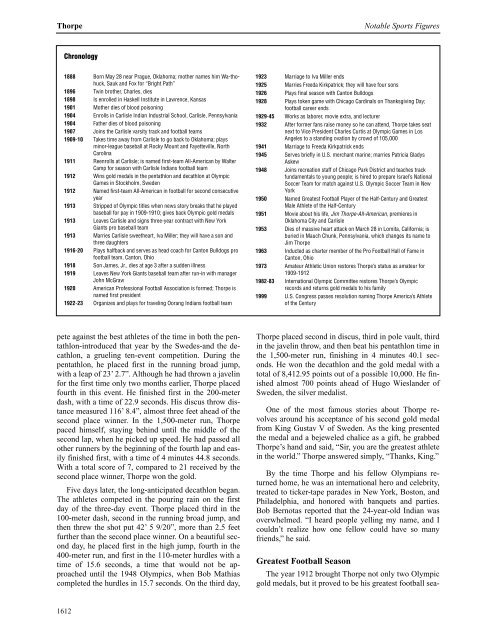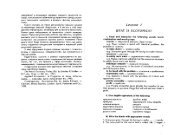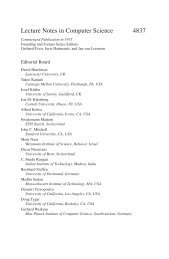Frank Thomas
Frank Thomas
Frank Thomas
Create successful ePaper yourself
Turn your PDF publications into a flip-book with our unique Google optimized e-Paper software.
Thorpe Notable Sports Figures<br />
Chronology<br />
1888 Born May 28 near Prague, Oklahoma; mother names him Wa-thohuck,<br />
Sauk and Fox for “Bright Path”<br />
1896 Twin brother, Charles, dies<br />
1898 Is enrolled in Haskell Institute in Lawrence, Kansas<br />
1901 Mother dies of blood poisoning<br />
1904 Enrolls in Carlisle Indian Industrial School, Carlisle, Pennsylvania<br />
1904 Father dies of blood poisoning<br />
1907 Joins the Carlisle varsity track and football teams<br />
1909-10 Takes time away from Carlisle to go back to Oklahoma; plays<br />
minor-league baseball at Rocky Mount and Fayetteville, North<br />
Carolina<br />
1911 Reenrolls at Carlisle; is named first-team All-American by Walter<br />
Camp for season with Carlisle Indians football team<br />
1912 Wins gold medals in the pentathlon and decathlon at Olympic<br />
Games in Stockholm, Sweden<br />
1912 Named first-team All-American in football for second consecutive<br />
year<br />
1913 Stripped of Olympic titles when news story breaks that he played<br />
baseball for pay in 1909-1910; gives back Olympic gold medals<br />
1913 Leaves Carlisle and signs three-year contract with New York<br />
Giants pro baseball team<br />
1913 Marries Carlisle sweetheart, Iva Miller; they will have a son and<br />
three daughters<br />
1916-20 Plays halfback and serves as head coach for Canton Bulldogs pro<br />
football team, Canton, Ohio<br />
1918 Son James, Jr., dies at age 3 after a sudden illness<br />
1919 Leaves New York Giants baseball team after run-in with manager<br />
John McGraw<br />
1920 American Professional Football Association is formed; Thorpe is<br />
named first president<br />
1922-23 Organizes and plays for traveling Oorang Indians football team<br />
pete against the best athletes of the time in both the pentathlon-introduced<br />
that year by the Swedes-and the decathlon,<br />
a grueling ten-event competition. During the<br />
pentathlon, he placed first in the running broad jump,<br />
with a leap of 23’ 2.7”. Although he had thrown a javelin<br />
for the first time only two months earlier, Thorpe placed<br />
fourth in this event. He finished first in the 200-meter<br />
dash, with a time of 22.9 seconds. His discus throw distance<br />
measured 116’ 8.4”, almost three feet ahead of the<br />
second place winner. In the 1,500-meter run, Thorpe<br />
paced himself, staying behind until the middle of the<br />
second lap, when he picked up speed. He had passed all<br />
other runners by the beginning of the fourth lap and easily<br />
finished first, with a time of 4 minutes 44.8 seconds.<br />
With a total score of 7, compared to 21 received by the<br />
second place winner, Thorpe won the gold.<br />
Five days later, the long-anticipated decathlon began.<br />
The athletes competed in the pouring rain on the first<br />
day of the three-day event. Thorpe placed third in the<br />
100-meter dash, second in the running broad jump, and<br />
then threw the shot put 42’ 5 9/20”, more than 2.5 feet<br />
further than the second place winner. On a beautiful second<br />
day, he placed first in the high jump, fourth in the<br />
400-meter run, and first in the 110-meter hurdles with a<br />
time of 15.6 seconds, a time that would not be approached<br />
until the 1948 Olympics, when Bob Mathias<br />
completed the hurdles in 15.7 seconds. On the third day,<br />
1612<br />
1923 Marriage to Iva Miller ends<br />
1925 Marries Freeda Kirkpatrick; they will have four sons<br />
1926 Plays final season with Canton Bulldogs<br />
1928 Plays token game with Chicago Cardinals on Thanksgiving Day;<br />
football career ends<br />
1929-45 Works as laborer, movie extra, and lecturer<br />
1932 After former fans raise money so he can attend, Thorpe takes seat<br />
next to Vice President Charles Curtis at Olympic Games in Los<br />
Angeles to a standing ovation by crowd of 105,000<br />
1941 Marriage to Freeda Kirkpatrick ends<br />
1945 Serves briefly in U.S. merchant marine; marries Patricia Gladys<br />
Askew<br />
1948 Joins recreation staff of Chicago Park District and teaches track<br />
fundamentals to young people; is hired to prepare Israel’s National<br />
Soccer Team for match against U.S. Olympic Soccer Team in New<br />
York<br />
1950 Named Greatest Football Player of the Half-Century and Greatest<br />
Male Athlete of the Half-Century<br />
1951 Movie about his life, Jim Thorpe-All-American, premieres in<br />
Oklahoma City and Carlisle<br />
1953 Dies of massive heart attack on March 28 in Lomita, California; is<br />
buried in Mauch Chunk, Pennsylvania, which changes its name to<br />
Jim Thorpe<br />
1963 Inducted as charter member of the Pro Football Hall of Fame in<br />
Canton, Ohio<br />
1973 Amateur Athletic Union restores Thorpe’s status as amateur for<br />
1909-1912<br />
1982-83 International Olympic Committee restores Thorpe’s Olympic<br />
records and returns gold medals to his family<br />
1999 U.S. Congress passes resolution naming Thorpe America’s Athlete<br />
of the Century<br />
Thorpe placed second in discus, third in pole vault, third<br />
in the javelin throw, and then beat his pentathlon time in<br />
the 1,500-meter run, finishing in 4 minutes 40.1 seconds.<br />
He won the decathlon and the gold medal with a<br />
total of 8,412.95 points out of a possible 10,000. He finished<br />
almost 700 points ahead of Hugo Wieslander of<br />
Sweden, the silver medalist.<br />
One of the most famous stories about Thorpe revolves<br />
around his acceptance of his second gold medal<br />
from King Gustav V of Sweden. As the king presented<br />
the medal and a bejeweled chalice as a gift, he grabbed<br />
Thorpe’s hand and said, “Sir, you are the greatest athlete<br />
in the world.” Thorpe answered simply, “Thanks, King.”<br />
By the time Thorpe and his fellow Olympians returned<br />
home, he was an international hero and celebrity,<br />
treated to ticker-tape parades in New York, Boston, and<br />
Philadelphia, and honored with banquets and parties.<br />
Bob Bernotas reported that the 24-year-old Indian was<br />
overwhelmed. “I heard people yelling my name, and I<br />
couldn’t realize how one fellow could have so many<br />
friends,” he said.<br />
Greatest Football Season<br />
The year 1912 brought Thorpe not only two Olympic<br />
gold medals, but it proved to be his greatest football sea-

















